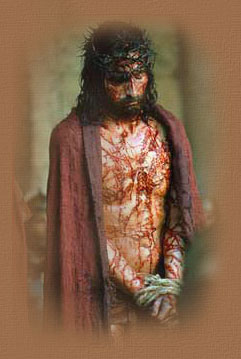 If Christ, by dying, has made full satisfaction, then God can consistently pardon the greatest of sinners that believe (John Flavel)
The Old Testament laws pertaining to animal sacrificial offering reveal many aspects of the redemption benefits Christ purchased for humanity on the cross. Under the Old Covenant, forgiveness for breaking God's laws in the life of an individual was forgiven when he brought, of his own free will, an offering to the Lord. Guilty offenders were required to give in accordance with their ability to provide an offering. It reminded them that they must offer God the costly gift of life, because the "life is in the blood" (Lev.17:11)
The person presenting his offering laid one of his hands on the head of the animal, with the other hand he took a razor sharp knife and sliced its throat. The hand on the head of the animal symbolized an exchange that occurred between the sacrifice and the one presenting it. The offering, although undeserving of death, became a substitute in behalf of the individual who was guilty of breaking the law of God. The sacrificial animal assumed the judgment due to the one presenting the sin offering. Hands on the head represented a transfer of guilt to the innocent party who deserved to live, and a transfer of innocence to the guilty party who deserved to die. Life was exchanged for death and death exchanged for life. He shall put his hand on the head of the burnt offering, and it will be accepted on his behalf to make atonement for him (Leviticus 1:4)
The ritual also depicted an exchange of natures. Animals have no knowledge of sin so in the act of giving an offering, one symbolically exchanged natures with the offering. Our sin nature, a nature knowing both good and evil, was traded for the sinless purity of an innocent offering. A soul exchanged for a soul, like when Christ exchanged His soul for ours, becoming our substitutionary offering on the cross. 2 Corinthians 5:21 says, "For God made Jesus who knew no sin to be sin for us, that we might become the righteousness of God in Christ." Through the death of Jesus Christ we have received a new nature, been forgiven of our sin and our condemnation for sin has been transferred to Christ who died for us. We are free to live and walk in fellowship with God through the sacrificial offering Christ freely gave for us. Jesus died for the guilty and John made reference to this when he saw him coming to be baptized and said "Look, the Lamb of God, who takes away the sin of the world"! (John 1:29 NIV) Human work and methods will never rise to the lever of the work of Jesus on the cross and rob Him of the glory that He alone deserves as Savior. Jesus uniquely satisfied mankind’s guilt, wrath and alienation by redeeming humanity, appeasing God, and fulfilling scripture through His atoning blood. (1 Tim 2:5): "at-one-maker between God and man." (from Fausset's Bible Dictionary)


www.ClearVisionBibleStudies.Com
|